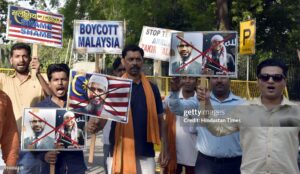Dr. Zakir Naik’s Visit to Pakistan: Ambassador of Knowledge or Controversial Figure?
Explore Dr. Zakir Naik’s highly anticipated visit to Pakistan. Is he an ambassador of knowledge or a controversial figure? Dive into the debate and understand the impact of his arrival on religious harmony and ideological perspectives.
The Arrival of Dr. Zakir Naik in Pakistan:
Dr. Zakir Naik’s arrival in Pakistan has been a topic of considerable discussion in both media and public forums. His extensive knowledge of Islam, combined with his ability to engage in interfaith dialogues, makes him a respected figure among many Muslims worldwide. Pakistan, a country with a majority Muslim population, has long been a stronghold of religious scholarship, and Dr. Naik’s visit is seen as an opportunity for Muslims to gain more insight into the teachings of Islam and its comparative perspective with other religions.Understanding Dr. Zakir Naik: Scholar, Speaker, and Controversial Figure in Islamic Discourse” Many Pakistanis have eagerly awaited his lectures and speeches, hoping to benefit from his deep understanding of Islamic principles. However, his visit has also been met with criticism from some quarters, particularly from individuals and groups who view his interpretations as rigid or controversial.Dr. Zakir Naik: Ambassador of Knowledge:
One of the primary reasons for Dr. Naik’s global popularity is his unique approach to Islamic dawah (preaching). He is renowned for using logic and reason to explain the teachings of Islam, often drawing parallels between Islam and science, as well as making comparisons between Islam and other religions. His debates with religious leaders from other faiths have garnered millions of views on various platforms, making him an influential figure for those seeking clarity on religious matters. For many, Dr. Naik is an ambassador of knowledge, presenting Islam in a manner that resonates with contemporary audiences. His ability to address difficult questions on religion, science, and society has earned him a loyal following. In Pakistan, where religious scholarship is deeply revered, Dr. Naik’s visit is seen as an opportunity to further the understanding of Islam in an era where misinformation about religion is rampant. Dr. Naik’s speeches on topics like the role of women in Islam, the compatibility of Islam with modern science, and the importance of interfaith dialogue have influenced many. His focus on dispelling misconceptions about Islam has been welcomed by Muslims, particularly in countries where Islam is often misunderstood or misrepresented.The Controversial Side of Dr. Zakir Naik:
Despite his widespread appeal, Dr. Zakir Naik has not been free from controversy. His critics accuse him of promoting a strict interpretation of Islam, which they argue alienates followers of other sects and religions. Some of his statements on sensitive topics, such as jihad, have sparked outrage and led to accusations of promoting intolerance and extremism. In countries like India, Dr. Naik has faced legal challenges, and his Peace TV channel has been banned in several countries due to allegations that his speeches incite violence and extremism. Although Dr. Naik has repeatedly denied these accusations, his reputation remains polarized. In Pakistan, a country with a diverse religious landscape, including various Islamic sects and religious minorities, Dr. Naik’s visit is not without its challenges. Some fear that his hardline views could exacerbate sectarian tensions or promote an exclusionary understanding of Islam. Critics argue that while Dr. Naik’s knowledge of Islam is vast, his approach lacks the nuance required to foster religious harmony in a multi-sectarian society like Pakistan.The Debate: Religious Harmony or Ideological Division?
Dr. Zakir Naik’s visit to Pakistan has reignited debates on the role of religious scholars in shaping public opinion. On the one hand, his followers argue that his presence will boost religious education and provide clarity on key issues faced by Muslims in Pakistan. On the other hand, his critics fear that his views may deepen existing divides within the religious community. Pakistan has a history of religious diversity, with a significant population belonging to various sects of Islam, as well as non-Muslim minorities. The challenge of maintaining religious harmony in such a context is already significant. Dr. Naik’s visit, therefore, raises questions about whether his teachings will contribute to greater understanding among different religious groups or exacerbate ideological divides. Some religious scholars in Pakistan have welcomed Dr. Naik’s visit, hoping that his knowledge will provide guidance on addressing contemporary religious challenges. Others, however, caution against adopting his views wholesale, urging the public to approach his teachings with critical thought and consideration of Pakistan’s unique religious and cultural context.The Impact of Dr. Zakir Naik’s Teachings in Pakistan:
It is essential to consider the potential long-term impact of Dr. Zakir Naik’s visit on Pakistan’s religious discourse. His arrival could lead to a resurgence of interest in Islamic education, particularly among the youth, who are drawn to his use of modern technology and media to disseminate his message. In an age where many young Muslims seek answers to complex questions about faith and modernity, Dr. Naik’s lectures offer a platform for religious engagement. However, there is also the possibility that his teachings could lead to increased polarization within Pakistan’s religious landscape. His firm stance on certain issues may alienate those who adhere to more moderate or differing interpretations of Islam. The challenge for Pakistan will be to balance the positive aspects of Dr. Naik’s visit with the need for inclusivity and tolerance in its religious discourse.Conclusion
Dr. Zakir Naik’s visit to Pakistan presents both an opportunity and a challenge. As an ambassador of knowledge, his extensive understanding of Islam and ability to communicate effectively with modern audiences can benefit those seeking religious guidance. However, the controversies surrounding his views also raise concerns about the potential for ideological division. Ultimately, the success of Dr. Naik’s visit will depend on how his teachings are received by the Pakistani public. Whether he is embraced as a beacon of knowledge or viewed with skepticism as a controversial figure, his impact on Pakistan’s religious landscape will be closely watched in the coming months
Post Views: 55